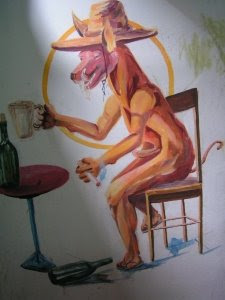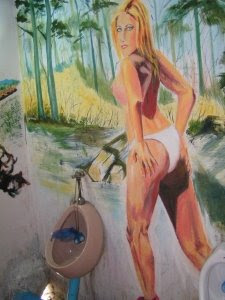This morning as I was waiting for my metro a young couple, mid-twenties perhaps, came to stand on the platform. They were well-dressed in a very businesslike style. The man was in a smart dark suit, the woman in smart light grey one. Both had briefcases. As they stood there, they took out their breakfasts and started to eat. The sandwiches were wrapped in foil which they dropped to the ground letting it blow away down the track. They washed them down with bottles of juice, throwing the plastic bottles to the ground. The man obviously wasn't very keen on crusts as, as the tram approached, he hurled the remnants of his sandwich into the bushes.
It was all done completely casually as if it had never even crossed their minds that there might be something wrong with anything they had done. Of course I didn't say anything, I never do, even smart people are likely to turn unpleasant confronted by someone calling them "irresponsible mindless litter louts".
The trouble is that I've seen where it can lead. A few years ago I was in Mexico. My first realisation that they might have a litter problem was as we killed time on the car park in the no man's land between the American and Mexican border posts. It was a pretty unpleasant couple of hours as we passed the time counting the types of rubbish that went blowing past, but it was nothing compared to where we camped. As it had been dark by the time we got into Mexico we had to pitch camp at the first apparently open ground we came to and next morning, seeing it for the first time in daylight we discovered a wilderness of broken bottles, empty cartons, rusty cans, cigarette packets, human and animal faeces and every other conceivable form of detritus. It wasn't a rubbish dump but it might as well have been. It would be facile to suggest that poverty is to blame for though it certainly plays a part it isn't really the cause. Just like the couple on the metro platform, it's more that people don't seem to care but in their case they may just have too many other priorities to worry about the rate at which the tidal wave of waste is destroying their ecology.
There is overpopulation - Mexico City alone has 22 million people - and over-industrialisation. There is the iniquity with which the indigenous Indian peoples are treated and the corresponding problems when they try to strike back. Mexico may just have too many other problems to get concerned about what is seen as 'litter'.
On the other hand the extent of the problem shouldn't be underestimated, a point made pointedly and poignantly two weeks later when we visited the Canon el Sumidero. This is tourist country, the kind of place where you show your best face to the world. Boatmen take visitors along the river and through the canyon. It is a spectacular and beautiful place with dramatic waterfalls plunging down from precipitous cliffs watched by the crocodiles as immobile as sand sculptures on the bank. At one point water cascades down for hundreds of feet over the trees washing the leaves and branches down as if the foliage were dark green blankets draped in layers across the hillside. The force of the water fills the air for dozens of yards with a fine cooling mist, like a gentle balm against your sun scorched skin. It is a gorgeous and magical sight. Until you look down at the river. It isn't the greasy unhealthy sheen that stops you dead, nor the sickly vivid green of the clogging algae. It is the sheer volume of the flotsam. there are plastic bottles and bags, pieces of broken furniture, rusty cans - all drifting slowly towards an ecological catastrophe. Where the eddies and currents wash it into the caves and crevices of the shoreline it is worse still. In places the water is scarcely visible at all such is the density of this grim tide.
For one night I thought we had avoided it. We made camp on one of the beaches somewhere on the gulf where there is a small turtle sanctuary. The water and the sand were clean. In the early evening we watched as a large bucketful of day old turtles were released at the water's edge to swim away into the ocean. I wandered away up the slope of the beach to where the dunes were covered in grass, where they started to turn into swampland. There, just out of site from our encampment were more plastic bottles and more discarded food wrappers. Who I wondered could have come all the way out here to dump this stuff ? I went to bed feeling depressed by the inevitability of it all.
The following morning there was a slightly more optimistic coda as I watched a group of men clearing some of it away in black sacks. I only hope they weren't taking it to dump in the river.
I'd like to mention one other incident, from another time on another continent. It was when I was on holiday in Switzerland. After leaving these grubby shores I had been astonished at how clean and tidy the place was. One day we went for a walk up to a lake in the mountains. It was a gorgeous day and everything was perfect. As we approached the lake there was a shock waiting. There, blowing around on the grassy lake shore was a single chocolate bar wrapper. I couldn't bear to see it so I went to pick it up to throw away later. And discovered that it was an English Kit-Kat wrapper. It was probably dropped by somebody in a suit.
Parts of this article previously appeared, in a slightly different form, on my website and as a column in the Express and Star newspaper.
It was all done completely casually as if it had never even crossed their minds that there might be something wrong with anything they had done. Of course I didn't say anything, I never do, even smart people are likely to turn unpleasant confronted by someone calling them "irresponsible mindless litter louts".
The trouble is that I've seen where it can lead. A few years ago I was in Mexico. My first realisation that they might have a litter problem was as we killed time on the car park in the no man's land between the American and Mexican border posts. It was a pretty unpleasant couple of hours as we passed the time counting the types of rubbish that went blowing past, but it was nothing compared to where we camped. As it had been dark by the time we got into Mexico we had to pitch camp at the first apparently open ground we came to and next morning, seeing it for the first time in daylight we discovered a wilderness of broken bottles, empty cartons, rusty cans, cigarette packets, human and animal faeces and every other conceivable form of detritus. It wasn't a rubbish dump but it might as well have been. It would be facile to suggest that poverty is to blame for though it certainly plays a part it isn't really the cause. Just like the couple on the metro platform, it's more that people don't seem to care but in their case they may just have too many other priorities to worry about the rate at which the tidal wave of waste is destroying their ecology.
There is overpopulation - Mexico City alone has 22 million people - and over-industrialisation. There is the iniquity with which the indigenous Indian peoples are treated and the corresponding problems when they try to strike back. Mexico may just have too many other problems to get concerned about what is seen as 'litter'.
On the other hand the extent of the problem shouldn't be underestimated, a point made pointedly and poignantly two weeks later when we visited the Canon el Sumidero. This is tourist country, the kind of place where you show your best face to the world. Boatmen take visitors along the river and through the canyon. It is a spectacular and beautiful place with dramatic waterfalls plunging down from precipitous cliffs watched by the crocodiles as immobile as sand sculptures on the bank. At one point water cascades down for hundreds of feet over the trees washing the leaves and branches down as if the foliage were dark green blankets draped in layers across the hillside. The force of the water fills the air for dozens of yards with a fine cooling mist, like a gentle balm against your sun scorched skin. It is a gorgeous and magical sight. Until you look down at the river. It isn't the greasy unhealthy sheen that stops you dead, nor the sickly vivid green of the clogging algae. It is the sheer volume of the flotsam. there are plastic bottles and bags, pieces of broken furniture, rusty cans - all drifting slowly towards an ecological catastrophe. Where the eddies and currents wash it into the caves and crevices of the shoreline it is worse still. In places the water is scarcely visible at all such is the density of this grim tide.
For one night I thought we had avoided it. We made camp on one of the beaches somewhere on the gulf where there is a small turtle sanctuary. The water and the sand were clean. In the early evening we watched as a large bucketful of day old turtles were released at the water's edge to swim away into the ocean. I wandered away up the slope of the beach to where the dunes were covered in grass, where they started to turn into swampland. There, just out of site from our encampment were more plastic bottles and more discarded food wrappers. Who I wondered could have come all the way out here to dump this stuff ? I went to bed feeling depressed by the inevitability of it all.
The following morning there was a slightly more optimistic coda as I watched a group of men clearing some of it away in black sacks. I only hope they weren't taking it to dump in the river.
I'd like to mention one other incident, from another time on another continent. It was when I was on holiday in Switzerland. After leaving these grubby shores I had been astonished at how clean and tidy the place was. One day we went for a walk up to a lake in the mountains. It was a gorgeous day and everything was perfect. As we approached the lake there was a shock waiting. There, blowing around on the grassy lake shore was a single chocolate bar wrapper. I couldn't bear to see it so I went to pick it up to throw away later. And discovered that it was an English Kit-Kat wrapper. It was probably dropped by somebody in a suit.
Parts of this article previously appeared, in a slightly different form, on my website and as a column in the Express and Star newspaper.

























